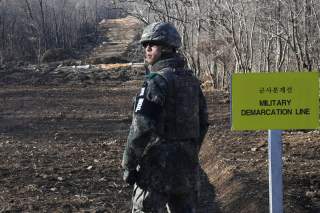North Korea and America’s Second Summit: Here’s What Jenny Town Thinks Will Happen
"While this type of summit outcome will never satisfy the critics of this negotiation process, it will bring clarity to working-level negotiators about where to focus efforts going forward."
Editor’s Note: Want more ideas on what will happen at the summit? Check out all 76 expert opinions we gathered here.
Though seemingly underwhelming, the outcome of the first summit between U.S. President Donald Trump and Kim Jong-un established direct access to the North Korean leader—an important development when dealing with a country where the leader has ultimate control—and secured commitments from both sides to mutual goals. The Singapore Summit’s joint statement lacked detail for how to achieve those goals, but it created both the top-down mandate to negotiate and a sense of what would need to be addressed to get to the end of the process. Given such a broad agenda though, it seems that the time since Singapore has been a rigorous exercise in figuring out where to start. And while there has been little agreement on this matter so far, it has at least been instructive about what won’t work.
Going into a second summit, there is pressure on both sides to come away with something more than political will. However, there should be no illusion that the summit will result in any kind of comprehensive agreement. Instead, getting top level consensus on what are a few practical, implementable next steps, along with a commitment to keep negotiating within the framework set by the Singapore joint statement, can renew momentum for both U.S.-DPRK and inter-Korean negotiations.
These steps will have to include specific actions that begin to cap and diminish North Korea’s nuclear capabilities, such as the decommissioning and verification of facilities at Yongbyon, which Kim has already indicated a willingness to do but requires clarification on exactly which facilities are included. This can only happen, however, if the U.S. also commits to concrete steps that are consistent with the goal of transforming U.S.-DPRK relations. While this could include such unilateral measures as lifting the travel ban, setting up liaison offices, or even refraining from imposing any new sanctions while negotiations are ongoing, it may also include exemptions for a specific inter-Korean project, such as railway cooperation, to incentivize the North’s compliance and bolster the inter-Korean peace process.
While this type of summit outcome will never satisfy the critics of this negotiation process, it will bring clarity to working-level negotiators about where to focus efforts going forward. It creates important opportunities for both sides to begin to build a track record of implementation and, in turn, can help build trust between these mutually skeptical actors. And it also provides then clear benchmarks against which progress can actually be assessed.
As we’ve seen through Kim Jong-un’s diplomacy with South Korea and China, regular high-level engagement and working-level follow through can move a process forward quickly as long as small successes are gained along the way.
Jenny Town is a research analyst at the Stimson Center and the Managing Editor and Producer of “38 North,” a web journal that provides policy and technical analysis on North Korea. She is the former assistant director of the U.S.-Korea Institute at Johns Hopkins School of Advanced International Studies where she focused on North Korea, U.S.-DPRK relations, and U.S.-ROK relations. You can follow her on Twitter at @j3nnyt0wn.
Image: Reuters.


